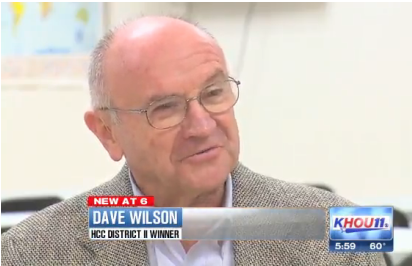I’m not sure what the point of this is.
Although a jury decided Dave Wilson lived where he claimed when he ran for the Houston Community College seat he holds, the drama surrounding the perennial candidate continues.
Harris County attorneys filed a motion Wednesday asking Judge Mike Engelhart, who oversaw Wilson’s three-day residency trial earlier this month, to overturn the jury’s unanimous finding and rule in the county’s favor. The county argues Wilson does not live in a warehouse on W. 34th Street that he claimed as his residence when running for the HCC seat in November.
[…]
“We are asking the judge to rule that as a matter of law Mr. Wilson should not be entitled to enjoy the benefits of having two different domiciles such that he derives benefits from both,” Assistant County Attorney Robert Soard said in an email. “We believe that claiming one domicile for one purpose (tax exemption) precludes, as a matter of law, simultaneously claiming a second domicile for a different purpose (qualification for public office). We are asking the judge to rule on this issue.”
Wilson won his case two weeks ago. I’m not a lawyer, so I’m not sure on what grounds the County Attorney is asking Judge Engelhart to throw out the jury verdict. Isn’t this what appeals courts are for? This story at least answers that question.
The county is using a legal tactic wherein a party can argue that the facts in a case are indisputable and a judge can determine a jury’s verdict was wrong. It’s called non obstante veredicto, Latin for notwithstanding the verdict, and is essentially the after-trial version of a summary judgment. While it’s not unusual, it’s not typically successful, legal experts said.
“You take your shot at it and see if it works – and usually it doesn’t. Ninety-nine times out of 100 it doesn’t,” said David Crump, a professor at the University of Houston Law Center who teaches civil procedure courses, among others.
[…]
Jury verdicts tend to be regarded as final, said Frank Carroll, who runs TexAppBlog.com, an appellate law blog for non-appellate lawyers, and coaches moot court and mock trial at the University of Houston Law Center.
“There’s almost a dogma that when a jury makes a verdict, we don’t like to upset those verdicts,” Carroll said. “As far as the odds go, it’s kind of a long shot. It’s not the longest shot, but certainly the odds are against you.”
However Judge Mike Engelhart rules after an Aug. 18 hearing, the dispute is likely far from over.
“No matter which way he rules, it’s going to go to the appellate court for a better answer,” Ray said.
Well, now I understand what the County Attorney has in mind. They say that if Wilson didn’t violate residency requirements, then those requirements have no meaning. I agree, but as much as I don’t like the jury’s verdict, I don’t see how you can say that it’s objectively wrong. The issue all along has been the vagueness of the legal requirements for residency, which is why I’ve suggested an easily verifiable standard that the Legislature could implement. But that has no bearing on this case. Here, the county claimed Wilson didn’t really live at that warehouse, Wilson claimed he did, and the jury believed him, or at least they didn’t believe the county enough. Not the result I wanted, but I can respect it. What am I missing here?


A judgment non obstante veredicto (aka a JNOV or a judgment notwithstanding the verdict) is a standard post-verdict motion asking the court to enter a verdict that disregards the jury’s findings. A JNOV can be granted if there is “no more than a scintilla” of evidence to support the jury finding, or when the evidence conclusively proves an issue contrary to the jury finding, or when there is a legal bar to the party from prevailing on its claim or defense (for example, if limitations ran). A JNOV cannot be granted where the evidence is disputed; as a result, they are not often granted.
As I take it from the news story, the county is saying that the question of Wilson’s residence shouldn’t even have been submitted to a jury, because the court should have ruled as a matter of law that where he claimed his homestead for tax purposes is where he was domiciled.
The trial court judge is a D. The Court of Appeals is (either the 1st or 14th) majority R. Anyone who thinks politics isn’t alive and well in courthouses is unfortunately mistaken. I still believe the verdict will be affirmed, though.
@ kenneth fair@ charles kuffner @myfanbase…, what kenneth forgets to tell you is ,a motion for jnov is almost always made verbally right after the =juries verdict,so the county attorney would have stood up and said something along these lines “your honor ,on these grounds we move for the court to grant a jnov”=however what county attorney vince ryan is doing is political grandstanding and playing to the media, by returning with this huge jnov motion filed weeks after the verdict=99.9% of the time the motion for jnov is made directly after the jury renders,0.000000001% you have some county attorney doing god knows what with the taxpayers monies and barrels back to court with a jnov=if i was the judge i would rule ryans request frivilous and apply legal sanctions against vince ryan,for sure.
i said and ,i wrote every word of it ,joshua ben bullard